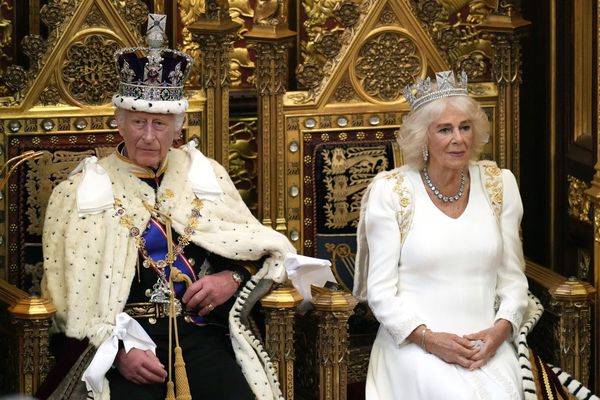The Australian share market has gained for a fourth-straight day after US stocks rose ahead of a key inflation report that could show American inflation has peaked, and amid higher energy prices.
The All Ordinaries index rose 0.6 per cent to 7,254, while the ASX 200 index put on nearly 0.7 per cent to 7,010.
It was the first time this month the ASX 200 climbed above the key 7,000-point mark.
Nine of the ASX 200's 11 sectors ended higher boosted by education firms, real estate, energy stocks, miners and banks.
Only health care firms and technology stocks weighed on the market.
The best performers on the ASX 200 were gold and nickel explorer Chalice Mining (+9.8 per cent), technology firm BrainChip Holdings (+5.8 per cent), and battery materials maker Novonix (+7.5 per cent).
Going down were Link Administration (-20.1 per cent), Ramsay Health Care (-10.4 per cent), and online bookmaker Pointsbet (-2.6 per cent).
The Australian dollar fell 0.1 per cent to 68.80 US cents at 4:15pm AEST.
Brent crude and spot gold fell from their overnight highs in today's trade.
Brent crude oil was trading at $US94.09 a barrel, up 0.1 per cent, while spot gold fell 0.1 per cent to $US1722.75 an ounce.
Consumer confidence weak
Consumer confidence rose slightly this month but it remained near historic lows.
The Westpac-Melbourne Institute Index of Consumer Sentiment rose 3.9 per cent from 81.2 in August to 84.4 in September, meaning pessimists still outnumber optimists.
Westpac chief economist Bill Evans said it was the first increase in confidence since November 2021 and came amid a strong employment market.
He said the improvement was a "little surprising" given continued sharp rises in the cost of living and the Reserve Bank's decision to raise interest rates this month by another 0.5 percentage points.
"Consumers may be a little less fearful, but confidence remains very weak," Mr Evans said.
"We have only seen sentiment at these low levels in the past during recessions or major economic disturbances such as the COVID pandemic or the global financial crisis."
Westpac said 57 per cent of consumers expect more interest rate rises of at least 1 per cent over the next year and their assessment of family finances compared to a year ago fell to the lowest level in 10 years.
However, consumers were more optimistic about their finances over the next 12 months.
Meantime, the Commonwealth Bank said its Household Spending Intentions index rose 0.8 per cent in August, and up by 15.1 per cent over the year amid last year's COVID-19 lockdowns.
Commonwealth Bank customers spent more on cars, but less on entertainment.
However, the bank expects household spending to weaken in the months ahead because of rising interest rates.
Businesses more confident
On the other hand, companies are more optimistic about the economy.
National Australia Bank said both business confidence and conditions edged higher in August, with confidence rebounding from its June low.
The survey found that employment and profitability are strong, and conditions remained robust across the states and most industries.
However, the construction industry saw both conditions and confidence fall, with low profitability the main challenge.
NAB said that with strong retail demand, firms continue to pass rising costs onto consumers.
Investors get $42 billion in dividends
CommSec estimates more than $42 billion in dividends will be paid to investors by ASX 200 companies after the August profit reporting season.
This compares with around $36 billion in dividend payouts in the February 2022 reporting period.
However, earnings were affected by many challenges, including floods in eastern Australia, COVID-19, supply chain challenges, higher interest rates, labour shortages, and the war in Ukraine.
"Despite all the challenges, revenue outpaced expenses, with many companies opting to pass on higher costs to consumers," said CommSec chief economist Craig James.
"And that approach served to support bottom-line profits."
Ramsay takeover in doubt
Private hospital operator Ramsay Health Care slumped after it said a multi-billion dollar takeover bid by a consortium led by US private equity firm KKR was in doubt because KKR would not improve its takeover offer.
In a statement to the market, Ramsay said KKR was not prepared to raise its takeover bid, and there was no certainty that any further proposal would be forthcoming or any proposal would result in a transaction.
Ramsay said the consortium cited the hospital operator's weak performance over the past year.
KKR told Ramsay that if the company was prepared to consider a lower offer the consortium "would move quickly to discuss mutually acceptable terms".
Share registry firm Link Administration's shares plunged by one fifth after it updated the market on the regulatory hurdles it is facing in the UK amid a $2.5 billion takeover by Dye and Durham, which provides information search and broking services.
Star faces loss of casino licence
Casino owner Star Entertainment Group rose 4.5 per cent cent after coming out of a trading halt.
That's despite the New South Wales gambling regulator finding the company was unsuitable to hold a gaming licence in New South Wales.
An inquiry into the casino operator heard allegations of money laundering, organised crime links and fraud.
Star is facing disciplinary action including the cancellation or suspension of its casino licence.
It said it will respond to a show cause notice from the regulator on why disciplinary action should not be taken against Star.
"The Star is currently considering the report and the matters raised in the notice," the company told the ASX.
Lynas Rare Earths fell (-0.6 per cent) after it said water supply at its plant in Malaysia was disrupted, which would significantly affect production over the quarter.
Power firm AGL Energy (+1.5 per cent) expects the outage at its Loy Yang A unit generator in Victoria to last until the second half of October.
Wall Street up for fourth day in a row
US Investors are hoping that August data will show the cost of living is easing in North America where inflation has reached a 40-year high this year.
The data will be closely watched for clues on how aggressive the US Federal Reserve will be next week in raising interest rates again to fight high inflation.
The consumer price figures are expected to show that headline inflation rose 8.1 per cent over the year to August compared to 8.5 per cent in July.
US futures are pricing in a rate hike of 0.75 percentage points after hawkish comments last week from US Federal Reserve chairman Jerome Powell and other US central bank officials.
If inflation decreases, the market is hoping the Fed will raise rates by less than expected after its meeting this month.
"Because of that, you're seeing a risk on type of mentality today," Robert Pavlik from Dakota Wealth in the US said.
"The market has now fully priced in a 75-basis-point hike for September, but it is hoping the next one is 50 basis points."
Other traders were encouraged by news that Ukraine had made progress in the war against Russia.
The US dollar fell to its lowest level in about two weeks against a basket of currencies following recent strong gains.
The Dow Jones Industrial Average rose 230 points or 0.7 per cent to 32,381, the S&P 500 rose 1 per cent to 4,110, and the Nasdaq Composite rose 1.3 per cent to 12,266.
The major US indices ended a three-week losing streak last week.
European stocks gained after Russia abandoned its main bastion in north-east Ukraine, in a sudden collapse of one of its principal front lines.
In London, the FTSE 100 index gained 1.7 per cent to 7,473, the CAC 40 in Paris rose 2 per cent to 6,334, and the DAX in Germany rose 2.4 per cent to 13,402.
The UK economy is showing strains from high inflation, with gross domestic product expanded by 0.2 percentage points in July from June.
The Bank of England expects the UK to slip into recession at the of this year and not come out of it until early 2024.
Oil prices gained amid mounting supply concerns heading into the northern hemisphere winter.
Brent crude oil rose 1.5 per cent to $US94.22 a barrel, while West Texas crude increased by 1.3 per cent to $US88.04 a barrel.
Global oil supply is expected to tighten further when a European Union oil embargo on Russian oil takes effect in early December.
Spot gold gained 0.5 per cent to $US1742.30 an ounce.
ABC/Reuters







